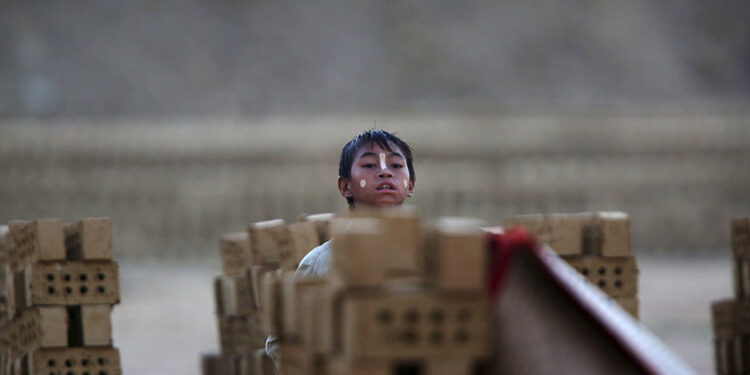In the Asia-Pacific region, more people than anywhere else start working from a young age. As youths, they often work in hazardous and exploitative jobs to earn income for their families. Some of this work constitutes child labor. This year, for World Day for Safety and Health at Work, the International Labor Organization (ILO) is focusing on improving the working conditions of young workers as well as bringing an end to child labor.
In Myanmar, there are more than 8 million workers aged between 15 and 24. These workers comprise 21 percent of the country’s workforce. Often it is poverty that pushes young people to start working from an early age. They enter the workforce with virtually no knowledge about occupational hazards and risks, nor any awareness about their occupational safety and health (OSH) rights.
Many young workers in Myanmar and in the rest of the Asia-Pacific are in the informal economy and are engaged in agricultural, industrial and artisanal work. These workplaces tend to be out of the reach of OSH laws and are otherwise difficult to inspect. In addition, workers frequently lack an understanding of the importance of OSH.
Poor working conditions and a lack of OSH training often translate to higher rates of injury among workers who would otherwise have had a long working career ahead of them. They are also at risk of contracting occupational diseases with harmful long-term effects. For example, exposure to hazardous agents such as asbestos, pesticides and other chemicals can ultimately lead to serious diseases and potentially death.
Concerted Tripartite Efforts
Providing young workers with decent and safe employment opportunities is indispensable for future social and economic development. Governments, employers and workers need to build, implement and continuously strengthen a culture of prevention. Indeed, the Myanmar government is currently engaging in regular tripartite dialogues to set standards and a new comprehensive OSH law, currently before the Parliament, will hopefully be adopted shortly.
It is crucial that national policies are in line with international labor standards. In particular, there should be full compliance with the ILO Promotional Framework for Occupational Safety and Health Convention, 2006 (No. 187).
Encouragingly, there have been increased ratifications of the Convention in the region, and we hope Myanmar will follow suit. Myanmar already ratified ILO Convention 182 on the worst forms of child labor in December 2013, and with the assistance of the ILO the government is in the process of finalizing its first National Action Plan on Child Labor and the list of hazardous jobs prohibited for workers under the age of 18.
Educating for a Safer Future of Work
While efforts to improve the current state of workplaces are critical, there must also be efforts to educate future generations in OSH. By one estimate, 65 percent of children in primary school today will work in jobs that currently do not exist. In order to ensure that these jobs do not jeopardize the health and safety of future generations, it is crucial that children are educated from a young age.
This system of early education should be provided consistently, thus promoting a culture of prevention.
When it comes to building a culture of prevention, clear and effective communication is essential. In Myanmar, the ILO’s Youth4OSH Project is providing organizations and networks with tools and strategies to raise workplace OSH awareness among young workers and young employers.
The ILO SafeYouth@Work Project is working to mainstream OSH in technical vocational education and training curricula so that young workers in Myanmar learn how to work safely at the same time that they acquire marketable job skills.
Educating young people on the importance of OSH is necessary for a safe future of work. We must do all we can to ensure that young people are aware of, and protected by, OSH principles so that they too are given the chance to work in a safe and healthy workplace.
Tomoko Nishimoto is an assistant director-general of the International Labor Organization and regional director for Asia and the Pacific.
















